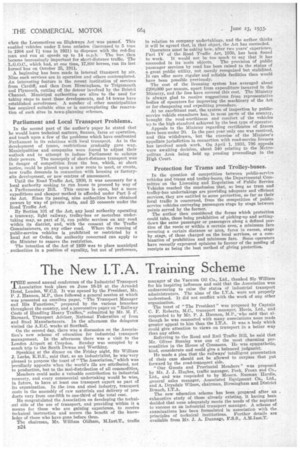The New I.T.A. Training Scheme
Page 38

If you've noticed an error in this article please click here to report it so we can fix it.
THE second annual conference of the Industrial Transport Association took place on June 16-18 at the Arundel Hotel, London, -W.C.2. It was opened by the President, Mr. P. J. Hannon, M.P., then followed a general session at which was presented an omnibus paper, "The Transport Manager and His Functions," prepared by the various branches throughout the country, and a provocative paper on " Railway Costs of Handling Heavy Traffics," submitted by Mr. M. F. Barnard, Transport Adviser, National Federation of Iron and Steel Manufacturers. In the afternoon the delegates visited the A.E.C. works at Southall.
On the second day, there was a discussion on the Association's new scheme of education for industrial transport management. In the afternoon there was a visit to the London Airport at Croydon. Sunday was occupied by a coach trip to the South Downs and Worthing.
Speaking at the dinner on the Friday night, Sir William J. Larke, K.B.E., said that, as an industrialist, he was-Tery pleased to propose the toast of "The Association," which was peculiarly apposite when the world's ills are attributed, not to production, but to the mal-distribution of all commodities,
Members could make a valuable contribution to industrial recovery, and every commercial undertaking would be wise, in future, to have at least one transport expert as part of its organization. In the iron and steel industry, transport costs in the assembly of raw materials and delivery of products vary from one-fifth to one-third of the total cost.
He congratulated the Association on developing the technical side of the use of transport, and providing within it a means for those who are gaining experience, to receive technical instruction and secure the benefit of the knowledge of those who have gone before them.
The chairman, Mr. William Oldham, M.Inst.T., traffic manager of the Vacuum Oil Co., Ltd., thanked Sir William for his inspiring influence and said that the Association was endeavouring to raise the status of industrial transport administrators. The aims of the LTA. were not properly understood. It did not conflict with the work of any other organization.
The toast of "The President" was proposed by Captain C. F. Roberts, M.C., transport manager, Hovis, Ltd., and responded to by Mr. P. J. Hannon, M.P., -who said that although he was connected with many associations none made greater appeal to him than the I.T.A. It was a body which could giie attention to views on transport in a better way than any other.
Referring to the Road and Rail Traffic Bill, he said that Mr. Oliver Stanley was one of the most charming personalities in the House of Commons. He was sympathetic, kind, considerate and could give a balanced judgment.
He made a plea that the railways' intelligent presentation of their case should not be allowed to surpass that put forward by the road-transport side. " Our Guests and Provincial Members" was proposed by Mr. J. J. Hughes, traffic manager, Peek, Preen and Co., Ltd., and was responded to by Messrs. Norman Hardie, *general sales manager, Associated Equipment Co., Ltd., and A. Drysdale Wilson, chairman, Birmingham and District Branch, I.T.A.
The new education scheme has been prepared after an exhaustive study of those already existing, it having been decided that none adequately meets the needs of the aspirant to success as an industrial transport manager. A scheme of examinations has been formulated in association with the principles of technical institutions. Further details are available from Mr. J. A. Dunnage, F.S.S., A.M.In.st.T.




























































































